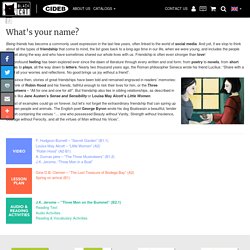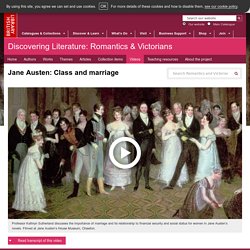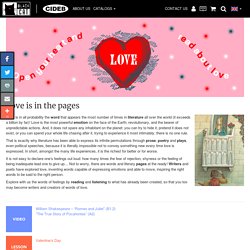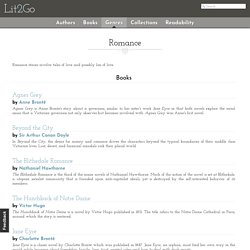

What's your name? Being friends has become a commonly used expression in the last few years, often linked to the world of social media.

And yet, if we stop to think about all the types of friendship that come to mind, the list goes back to a long-ago time in our life, when we were young, and includes the people we met along the way and who have sometimes shared our whole lives with us. Friendship is often even stronger than love! This profound feeling has been explored ever since the dawn of literature through every written and oral form: from poetry to novels, from short stories to plays, all the way down to letters.
Nearly two thousand years ago, the Roman philosopher Seneca wrote his friend Lucilius: “Share with a friend all your worries and reflections. No good brings us joy without a friend”. The list of examples could go on forever, but let’s not forget the extraordinary friendship that can spring up between people and animals. F. Gina D.B.
J.K. Ac-nantes - anglais - Webinaire : Romeo and Juliet en LLCE. Ac-nantes - anglais - Webinaire : Jane Austen en cours de LLCE. Sujet zéro - Rencontres - Solitude. William Shakespeare. Jane Austen: Class and marriage. In the society in which Jane Austen lives – and remember, of course, we're dealing essentially with the middle and upper classes – she's never looking at the kind of society that Dickens looks at, she's not looking at the kind of poverty that Dickens describes, say, in Bleak House or Oliver Twist.

She's looking at society for middle class women and in her society, at this particular time, inherited property runs through the male line. So a woman might be borne into affluent circumstances, but you will find that that affluence does not follow her through life. The only way to ensure it, is marriage and that's why, of course, marriage is so important in Jane Austen's novels. It's why too, that even though we enjoy the romantic fulfilment, which is such an important part of those novels and of the course of the plot that runs through them, we're never allowed to forget that material circumstances matter.
Sujet zéro - Rencontres - Amour. Love is in the pages. Love is in all probability the word that appears the most number of times in literature all over the world (it exceeds a billion by far)!

Love is the most powerful emotion on the face of the Earth; revolutionary, and the bearer of unpredictable actions. And, it does not spare any inhabitant on the planet: you can try to hide it, pretend it does not exist, or you can spend your whole life chasing after it, trying to experience it most intimately; there is no one rule. That is exactly why literature has been able to express its infinite permutations through prose, poetry and plays, even political speeches, because it is literally impossible not to convey something new every time love is expressed. In short, amongst the many life experiences, it is the richest for better or for worse. Explore with us the words of feelings by reading and listening to what has already been created, so that you too may become writers and creators of words of love. Valentine’s Day.
Listen and read - Romance. Agnes Grey by Anne Brontë Agnes Grey is Anne Bronte's story about a governess, similar to her sister's work Jane Eyre in that both novels explore the social issues that a Victorian governess not only observes but becomes involved with.

Agnes Grey was Anne's first novel. Beyond the City by Sir Arthur Conan Doyle In Beyond the City, the desire for money and romance drives the characters beyond the typical boundaries of their middle class Victorian lives. The Blithedale Romance by Nathaniel Hawthorne The Blithedale Romance is the third of the major novels of Nathaniel Hawthorne. The Hunchback of Notre Dame by Victor Hugo The Hunchback of Notre Dame is a novel by Victor Hugo published in 1831.
Jane Eyre by Charlotte Brontë Jane Eyre is a classic novel by Charlotte Brontë which was published in 1847. Little Women by Louisa May Alcott Little Women concerns the lives and loves of four sisters growing up during the American Civil War. Anthology Two: Relationships - GCSE English Literature Revision - CCEA - BBC Bitesize.